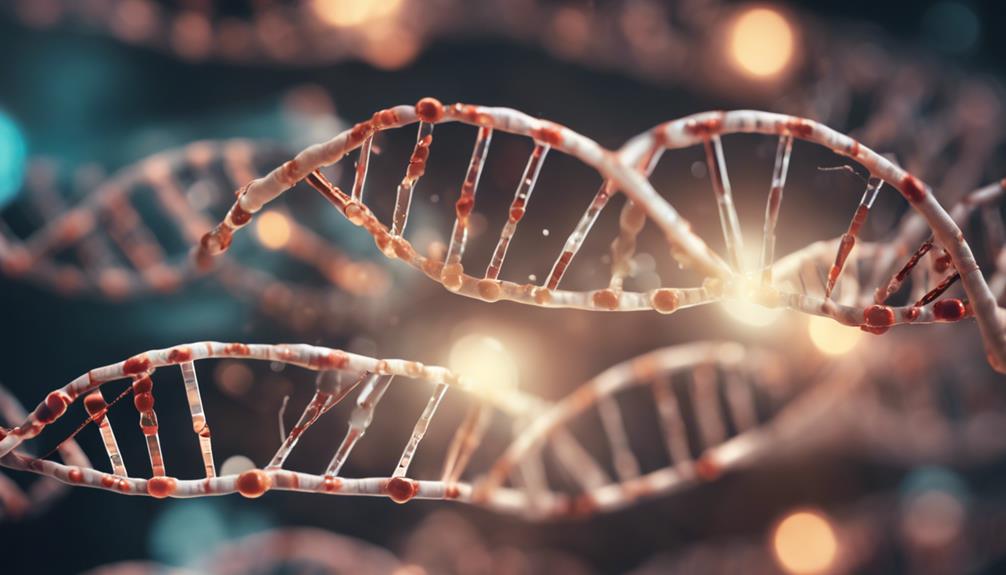To determine if you have Narcissistic Personality Disorder, it is crucial to consider a combination of genetic predispositions and environmental influences. Genetic factors establish the susceptibility to NPD, affecting how individuals seek validation and exhibit specific traits. Environmental elements such as parenting styles and childhood experiences are key in shaping the development of NPD. The interaction between genetics and upbringing significantly adds to the complexity of NPD. Traits may start appearing during adolescence or early adulthood, showing a mix of innate and learned behaviors. By examining these elements, we can gain a better understanding of the intricate nature of Narcissistic Personality Disorder.
Key Takeaways
- Genetic factors lay the groundwork for NPD susceptibility.
- No single gene is solely responsible for NPD development.
- Genetics interact with environment to influence NPD traits.
- Childhood experiences, like abuse, can impact NPD development.
- Nurturing relationships in childhood can mitigate NPD traits.
Genetic Factors in NPD Development
Genetic factors play a significant role in shaping the development of Narcissistic Personality Disorder (NPD), though they don't directly cause the disorder. While not the sole determinant, genetics lay the groundwork for potential NPD susceptibility.
In children, certain traits like confidence are often nurtured and rewarded, creating an environment where self-centered behaviors may flourish. The genetic predispositions towards seeking validation and admiration can interact with upbringing, where children conditioned to believe they're exceptional may be more prone to developing NPD.
Empathy, on the other hand, a trait essential for healthy social interactions, may be undervalued in such environments, further exacerbating the development of NPD. The interplay between genetic factors and environmental influences is vital in understanding how NPD manifests.
Environmental Influences and NPD

Moving from the influence of genetics, we now shift our focus to the impact of environmental factors on the development of Narcissistic Personality Disorder (NPD). Environmental influences, such as parenting style and childhood experiences, play an essential role in shaping individuals with NPD traits. Overprotective or neglectful parenting can contribute to the development of NPD, as children raised to believe they are extraordinary or entitled may be more prone to developing narcissistic traits. Rewards for characteristics like confidence, coupled with less emphasis on empathy, can further fuel the development of NPD.
To better understand the influence of environmental factors on NPD, let's explore the table below:
| Parenting Style | Childhood Experiences | Development of NPD |
|---|---|---|
| Overprotective | Entitled beliefs | Rewards for traits |
| Neglectful | Lack of empathy | Nurturing relationships |
| Balanced |
Nurturing and balanced relationships during early life are crucial in mitigating the development of NPD traits. Balancing praise with constructive feedback and fostering empathy can help create a healthier environment for individuals susceptible to NPD.
Nature Vs. Nurture in NPD

Genetic influences and environmental factors both contribute to the development of narcissistic personality disorder.
While genetics may predispose individuals to certain traits, their upbringing and experiences also play a vital role in shaping their behavior.
Understanding the intricate balance between nature and nurture is key to unraveling the complexities of narcissistic tendencies.
Genetic Influences in NPD
While genetic factors play a role in the development of Narcissistic Personality Disorder (NPD), it's important to recognize the significant influence of environmental factors in shaping the manifestation of NPD traits. Research indicates that there's no single gene responsible for NPD, highlighting the complexity of its genetic underpinnings.
Factors such as upbringing and conditioning play a pivotal role in how NPD traits are expressed. Children who are raised to believe they're exceptional or entitled may be more predisposed to developing NPD. Additionally, the emphasis on certain traits like confidence, while potentially neglecting empathy, can impact the development of NPD.
Understanding the interplay between genetic predispositions and environmental influences is crucial in comprehending the multifaceted nature of Narcissistic Personality Disorder.
Environmental Factors in NPD
Parenting styles and childhood experiences greatly influence the development of Narcissistic Personality Disorder (NPD). Overprotective or neglectful parenting can heighten the risk of developing narcissistic traits. Negative childhood experiences, like emotional abuse or neglect, play a pivotal role in shaping NPD.
The interaction between genetic predispositions and environmental influences is key in understanding the nature vs. nurture debate in NPD. Social interactions also play a crucial role in the manifestation of NPD. Recognizing the impact of early life experiences on the development of this disorder is vital.
Genetic Predispositions in NPD

Sometimes, individuals with Narcissistic Personality Disorder inherit certain predispositions that can contribute to the development of the disorder. While genetic factors don't solely determine NPD, they play a significant role in its development.
Children raised in environments where they're constantly praised for being exceptional may be more prone to developing NPD, as traits like confidence are often rewarded while empathy may be overlooked. It's important to note that there isn't a specific gene responsible for NPD, but genetic predispositions can interact with environmental factors such as family dynamics and upbringing to influence the manifestation of NPD traits.
Understanding these genetic predispositions can provide insight into how NPD develops and how it can potentially be addressed. By recognizing the interplay between genetic and environmental factors, individuals and professionals can work towards better understanding and managing Narcissistic Personality Disorder.
Impact of Childhood Experiences on NPD
Childhood experiences, like abuse and neglect, play a significant role in shaping Narcissistic Personality Disorder (NPD).
The way parents interact with children can greatly influence the development of NPD traits.
Understanding the impact of early life experiences is key to addressing and managing symptoms of NPD.
Childhood Trauma and NPD
Experiences of early trauma profoundly shape the development of Narcissistic Personality Disorder (NPD) in individuals. Childhood trauma, including abuse or neglect, can lead to NPD by impacting self-esteem and fostering a sense of entitlement.
Invalidating parenting, where emotional needs are dismissed, contributes to the lack of empathy often seen in individuals with NPD. Exposure to criticism and a lack of emotional support during childhood may diminish empathy and lead to maladaptive coping mechanisms in adulthood.
Adverse events like parental overvaluation can fuel grandiosity in those with NPD. These early traumatic experiences play a significant role in shaping emotional regulation and interpersonal relationships for individuals with NPD, highlighting the importance of childhood experiences in the development of this disorder.
Parental Influence on NPD
Parental influence greatly shapes the development of Narcissistic Personality Disorder (NPD), particularly through the early dynamics and interactions within the family environment. Childhood experiences, like abuse or neglect, can markedly contribute to the formation of NPD.
Parenting styles that are overprotective or neglectful may heighten the risk of NPD in individuals. Children brought up with a sense of exceptionalism and entitlement are more predisposed to displaying NPD traits later in life. Negative experiences during childhood can mold an individual's self-view and influence the emergence of NPD.
Early relationships and interactions play a pivotal role in fostering narcissistic traits in individuals. It's essential to recognize how these factors intersect to understand the impact of parental influence on the development of NPD.
Understanding NPD Etiology

Genetic and environmental factors intertwine to shape the development of Narcissistic Personality Disorder (NPD), with brain structure differences and childhood experiences playing significant roles. The genetic predisposition towards NPD can be influenced by environmental triggers, such as trauma or neglect during childhood.
Brain structure variations affecting empathy and cognitive functioning can contribute to the manifestation of NPD traits. Additionally, early life experiences, especially abuse and neglect, can have a profound impact on the development of NPD, leading to behaviors characterized by an oversensitive temperament and manipulative tendencies.
- Genetic factors and environmental influences can interact to predispose individuals to NPD.
- Brain structure differences impacting empathy and cognitive processing may contribute to NPD development.
- Childhood experiences, particularly abuse and neglect, play an important role in shaping NPD traits, which often emerge in teenage years or early adulthood.
Frequently Asked Questions
Can You Be Born With Narcissistic Personality Disorder?
We can inherit certain genetic predispositions that make us more susceptible to developing narcissistic traits, but there isn't a single gene responsible for Narcissistic Personality Disorder (NPD).
Environmental factors, like upbringing and experiences, also heavily influence the development of NPD.
How Does a Person Get Narcissistic Personality Disorder?
We acquire Narcissistic Personality Disorder (NPD) through a complex interplay of genetic predispositions and environmental influences. Factors like brain structure differences and adverse childhood experiences can contribute to the development of NPD.
Typically emerging in the teenage years or early adulthood, NPD is characterized by oversensitive temperament and manipulative behavior. Managing NPD entails addressing emotional dysregulation, lack of empathy, and their impacts on mental health.
Are You Born a Narcissist or Is It Learned?
We can't deny that the question 'are you born a narcissist or is it learned?' sparks a fascinating debate. Genetic predispositions and environmental influences both play significant roles in shaping narcissistic traits.
Research indicates that while individuals may have a genetic predisposition to narcissistic tendencies, childhood experiences like overindulgence or neglect can also greatly impact the development of narcissistic traits. Understanding this balance is key to comprehending the complexity of narcissistic personality development.
Do Narcissists Ever Change?
Yes, narcissists can change, but it's a tough journey. Willingness and consistent effort are important.
Long-term therapy and self-reflection play a significant role in transformation. However, narcissists might resist seeking help and struggle with introspection.
Personal growth and self-awareness are essential for behavior change. Support from mental health professionals and loved ones can aid in this process.
It's a challenging path, but change is possible with dedication and support.
– Can Narcissistic Personality Disorder be inherited or is it developed over time?
Narcissistic Personality Disorder can have both genetic and environmental factors, contributing to its development. While there may be a genetic predisposition, environmental influences and upbringing also play a significant role. However, treatment options for narcissistic personality disorder are available and include therapy, medication, and support groups.
Conclusion
To sum up, whether you're born with narcissistic personality disorder or develop it due to environmental factors, the key is to seek help and support. Understanding the complex interplay of genetics and upbringing can shed light on the origins of NPD, but ultimately, treatment and therapy are essential for managing the condition.
By addressing underlying issues and working towards self-awareness, individuals can navigate the challenges of NPD with compassion and resilience. Remember, it's never too late to seek help and make positive changes.









